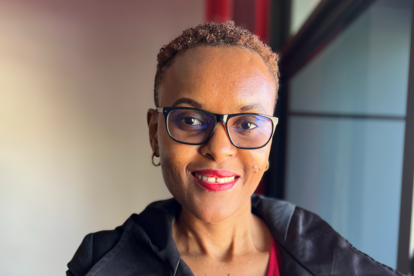Since my early years, I had a dream of becoming a member of Tanzania's Parliament to enact positive changes and help marginalized groups, particularly women and young people, achieve their full potential. This aspiration fueled my decision to study economics, driven by the belief that through effective governance, we can create a more inclusive society.
Life often presents unexpected twists and turns, and while my path didn't lead me to become a MP, I found opportunities to work towards my goals. For instance through supporting the Tanzanias Public Service Reform Programme II as an Economist at the President’s Office-Public Service Management and Good Governance.
My journey with HELVETAS Tanzania began in September 2022 where I helped developing Helvetas first governance project in Tanzania "Active Citizens for Inclusive Urban Development," or "Sauti na Nafasi" in Swahili, whose pilot phase starts this July.
Fostering an open, participatory, and people-centered urban development process
In central Tanzania’s Singida, we will engage the municipality, its departments, and affiliated bodies with its citizens. We strive to create an environment where duty bearers provide space for right holders, actively listen to their voices, and involve them in planning for improved, efficient, need-based, demand-driven, and sustainable service delivery. Simultaneously, we aim to empower right holders to express their demands, participate in decision-making processes, and hold duty bearers accountable by demanding transparency and improved service provision.
What I have learned in setting up the project
- When local communities are given the opportunity to voice their concerns, they have a wealth of knowledge and experiences to contribute. All they require is a supportive space that allows them to express themselves freely.
- Culture can hinder Tanzanian women from speaking up in the presence of men. However, when provided with an environment that respects their privacy, they become more active and willing to share their experiences and challenges.
- Tanzanian youth constitute a significant demographic. 70% of the estimated 60 million people here are under 30, yet their involvement in community decision-making and affairs affecting them is minimal. They rarely participate in community meetings, and understanding the reasons behind this apathy and finding effective solutions is crucial. After all, the youth are the future generation!
What we plan for collaborations and partnerships to yield results
- The Government of Tanzania (GOT) has implemented a revolving fund, which mandates Local Government Authorities (LGAs) to allocate 10 percent of their own revenue – with four percent dedicated to women's and youth groups each, while two percent is designated for people with disabilities. This approach, already observed in Singida Municipality, serves as a promising starting point. However, further support from non-public actors is necessary to strengthen this effort.
- The President's Office-Regional Administration and Local Government (PO-RALG) and Singida Municipal Council have provided invaluable support during study visits to the project area. We look forward to nurturing and strengthening these bonds as we strive to serve our citizens.
- Engaging with other actors, such as civil society organizations (CSOs) and the private sector, underscores the importance of coming together for a common goal. Sharing experiences and networking create a collaborative environment conducive to achieving our objectives.
Finally, Singida is a captivating place. The local people, primarily the Nyaturu and Nyiramba communities, are exceptionally friendly. The local chicken dishes are famous across Tanzania. The region offers numerous investment opportunities in sectors like tourism and agriculture. For those seeking a picture view of the Singidani Lake, I highly recommend booking a stay at one of the lakeside hotels.
About the Author


